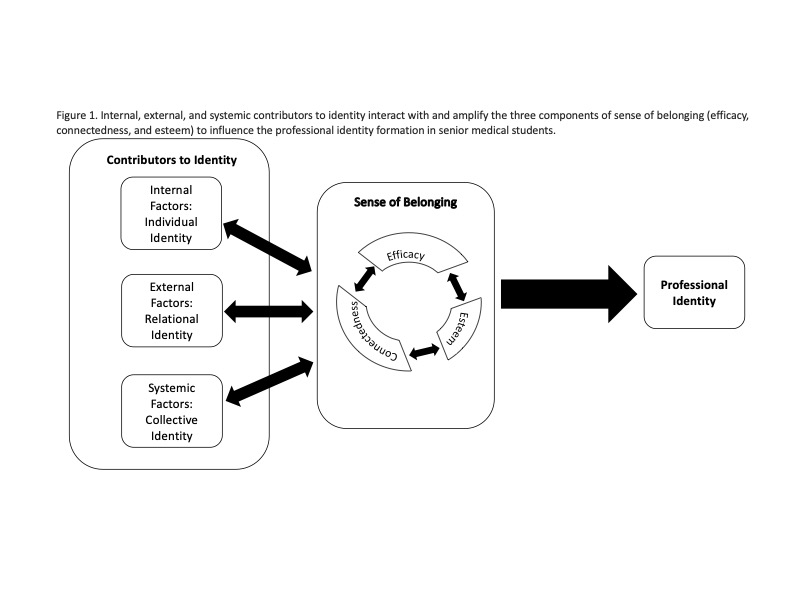Back
Background: Professional identity formation (PIF) in medical education is a dynamic socialization process whereby students incorporate, reject, or compromise ideas, skills, and perspectives on their journey to becoming a physician. Both the individual’s development and social contexts contribute to PIF, yet few investigations explore the influence of social interactions. Sense of belonging, which can be described as an individual feeling esteem, connectedness, and efficacy, is a fundamental need spanning many psychological theories.
Objective: Using the lens of social identity theory, the authors explored clinical experiences that senior medical students perceived to enhance and undermine sense of belonging and PIF.
Design/Methods: Pediatric educators with an interest in medical education and a desire to deepen understanding of sense of belonging and PIF used a phenomenological approach for this qualitative study. One-hour focus groups were conducted between 2/2022 and 5/2022 with senior medical students at six institutions. Prompted written reflections and demographics were collected using an anonymous online tool. Author teams coded transcriptions through an iterative process.
Results: Twenty-six students during six focus groups reported contributors to sense of belonging in clinical settings that were characterized as pre-existing identity (internal factors), perception of treatment by the medical team (external factors), and systemic structures. Internal factors included: first in medicine, underrepresented status, gender, and socioeconomic background. External factors included: shared suffering, communication of inclusion, relational closeness, and experiencing trust and autonomy. Systemic factors included: continued hierarchical nature of medicine, physical spaces, team diversity, and poorly communicated roles and expectations.
Conclusion(s): This study affirms that sense of belonging influences medical student PIF, broadens understanding of the complex interplay of internal, external, and systemic contributors to SB, and highlights the previously underreported contributions of shared experiences of suffering. Findings offer insight into educator development strategies to promote sense of belonging and enhance PIF including: using communication of inclusion, prioritizing team relational closeness, supporting graduated autonomy, promoting diversity of teams, and utilizing a transformational learning framework after exposure to shared suffering.

.jpg)
.jpg)
Medical Education: Medical Student
Medical Education 2: Student 1
475 - Promoting Medical Student Professional Identity Formation Through Sense of Belonging and Shared Suffering
Friday, April 28, 2023
5:15 PM – 7:15 PM ET
Poster Number: 475
Publication Number: 475.123
Publication Number: 475.123
Helen C. Wang, University of California, San Diego, La Jolla, CA, United States; Chad Vercio, Loma Linda University School of Medicine, Redlands, CA, United States; Nikita Nagpal, New York University Long Island School of Medicine, New York, NY, United States; Chris Peltier, Cincinnati Children's Hospital Medical Center, Cincinnati, OH, United States; Joseph A. Jackson, Duke University School of Medicine, Durham, NC, United States; Amal Khidir, Weill Cornell Medicine in Qatar, Doha, Ar Rayyan, Qatar; Caroline Paul, NYU Grossman School of Medicine, New York Cigy, NY, United States; Gary L. Beck Dallaghan, University of Texas at Tyler School of Medicine, Tyler, TX, United States; Terry Kind, Children's National Hospital / George Washington University, Washington, DC, United States; Amy Creel, LSUHSC, New Orleans, LA, United States
- HW
Helen C. Wang, MD (she/her/hers)
Assistant Clinical Professor
University of California, San Diego
La Jolla, California, United States
Presenting Author(s)
Background: Professional identity formation (PIF) in medical education is a dynamic socialization process whereby students incorporate, reject, or compromise ideas, skills, and perspectives on their journey to becoming a physician. Both the individual’s development and social contexts contribute to PIF, yet few investigations explore the influence of social interactions. Sense of belonging, which can be described as an individual feeling esteem, connectedness, and efficacy, is a fundamental need spanning many psychological theories.
Objective: Using the lens of social identity theory, the authors explored clinical experiences that senior medical students perceived to enhance and undermine sense of belonging and PIF.
Design/Methods: Pediatric educators with an interest in medical education and a desire to deepen understanding of sense of belonging and PIF used a phenomenological approach for this qualitative study. One-hour focus groups were conducted between 2/2022 and 5/2022 with senior medical students at six institutions. Prompted written reflections and demographics were collected using an anonymous online tool. Author teams coded transcriptions through an iterative process.
Results: Twenty-six students during six focus groups reported contributors to sense of belonging in clinical settings that were characterized as pre-existing identity (internal factors), perception of treatment by the medical team (external factors), and systemic structures. Internal factors included: first in medicine, underrepresented status, gender, and socioeconomic background. External factors included: shared suffering, communication of inclusion, relational closeness, and experiencing trust and autonomy. Systemic factors included: continued hierarchical nature of medicine, physical spaces, team diversity, and poorly communicated roles and expectations.
Conclusion(s): This study affirms that sense of belonging influences medical student PIF, broadens understanding of the complex interplay of internal, external, and systemic contributors to SB, and highlights the previously underreported contributions of shared experiences of suffering. Findings offer insight into educator development strategies to promote sense of belonging and enhance PIF including: using communication of inclusion, prioritizing team relational closeness, supporting graduated autonomy, promoting diversity of teams, and utilizing a transformational learning framework after exposure to shared suffering.

.jpg)
.jpg)
